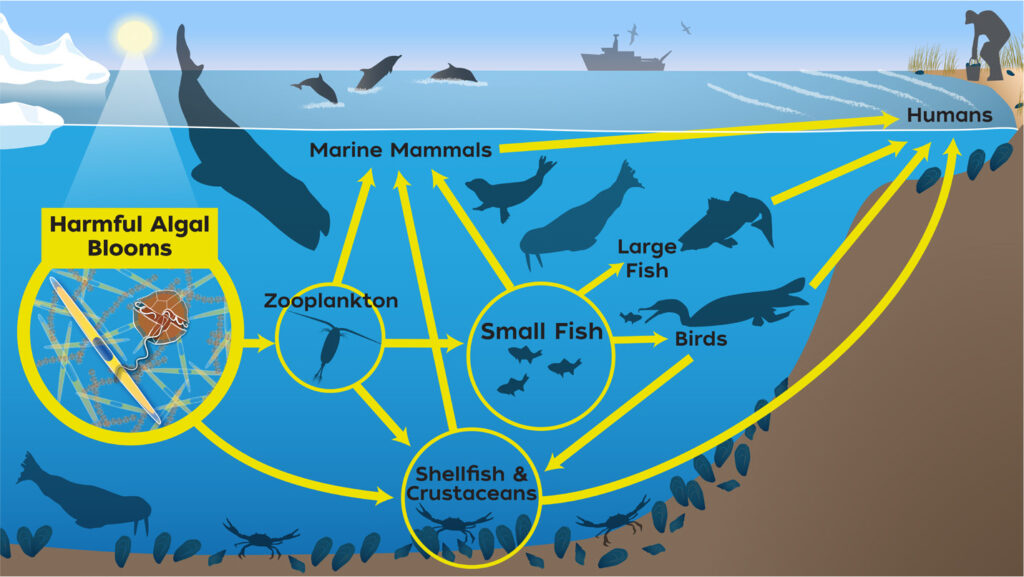Ecology and Oceanography of Harmful Algal Blooms
The NCCOS Competitive Research Program is pleased to announce a Fiscal Year 2024 Notice of Funding Opportunity (NOFO) for the Ecology and Oceanography of Harmful Algal Blooms (ECOHAB) Program.
Key Dates
- October 5, 2023 – Informational webinar. (Slides, Recording, and FAQ)
- October 18, 2023 – REQUIRED Letters of Intent (LOI) due by 11:59 p.m. ET. Email LOIs to nccos.grant.awards@noaa.gov; responses will be provided to applicants in approximately 2 weeks.
- January 31, 2024 – Applications due by 11:59 p.m. ET. Submit full applications to Grants.gov.
Resources for Applicants
- Quick Reference Guide for NCCOS Competitive Research Program Applications
- Sample Application
- FY2024 ECOHAB NOFO informational webinar: Slides, Recording, and FAQ
- Ongoing: Office hours with ECOHAB Program Manager Maggie Broadwater (schedule here)
Are you interested in serving as a panel reviewer for the ECOHAB program? Reviewers are critical to ensure NOAA funds the best possible science. Sign up here.
The ECOHAB program funds research to understand the causes and impacts of harmful algal blooms (HABs) and their toxins, which is fundamental for detecting, predicting, controlling, mitigating, and responding to HAB events. ECOHAB was authorized by the Harmful Algal Bloom and Hypoxia Research and Control Act (HABHRCA) in 1998 and reauthorized in 2004, 2014, and 2017.

ECOHAB is a national, peer-reviewed, competitive research funding program that seeks to achieve a holistic, quantitative understanding of nuisance and toxin-producing HABs to inform the development of predictive models, forecasts, mitigation tools, and prevention strategies.
ECOHAB’s priority areas include:
- The local and regional drivers that govern bloom initiation, maintenance, toxin production (where applicable), and termination from cellular-level processes to ecosystem-level interactions
- The biosynthesis and mechanism of toxicity of known and emerging toxins (including those that are tumor-promoting or lead to long-term effects), including their persistence in dissolved and particulate form, and degradation in aquatic ecosystems
- The uptake and depuration of toxins in commercial and subsistence seafoods and important prey species, including toxin biotransformation and fate
- The trophic transfer of toxins in aquatic food webs, including the consequences of exposure of humans and animals to HABs via various routes, and cell and toxicity thresholds for HAB toxins and secondary metabolites
- The presence of HAB toxins in subsistence resources and related risks to food safety and security
- The effects of environmental or anthropogenic changes, such as eutrophication, ocean acidification, or climate change, on HABs and their impacts
Targeted ECOHAB studies address fundamental ecological and oceanographic questions related to understanding HAB events; these studies are conducted by individual investigators or small teams and are typically 2 to 3 years in duration. Regional-scale and comparative, cross-regional ECOHAB investigations are conducted by multi-disciplinary and multi-institutional project teams and are typically 3 to 5 years in duration.
Current ECOHAB projects
- Life and Death of Karenia brevis Blooms in the Eastern Gulf of Mexico (2019)
- Oceanographic and Cellular Controls on Domoic Acid Production in the Central and Southern California Current System (2019)
- Multidisciplinary approach to a cross-regional problem: Dinophysis and DSP toxicity (2019)
- Trophic transfer and effects of HAB toxins in Alaskan marine food webs (2020)
- Coastal acidification and harmful dinoflagellate blooms: interactions and emerging implications for marine ecosystems and organisms (2022*)
- HAB dinoflagellate migrations across carbonate system gradients in an acidified ocean (2022*)
- Salish Sea HAB response to ocean acidification and concomitant stressors of increased sea surface temperature and nutrification (2022*)
- Synergistic impact of climate induced acidification, temperature, total alkalinity, and nutrients on cyanobacteria HABs in the Great Lakes (2022*)
*2022 Funding Opportunity: Integrated Research on Ocean & Coastal Acidification and Harmful Algal Blooms, in partnership with NOAA’s Ocean Acidification Program.
Notice of Funding Opportunity (NOFO) announcements for ECOHAB and other national competitive HAB programs are published on Grants.gov.
For more information, contact Maggie Broadwater.
- Detailed description of ECOHAB Program
- View all ECOHAB Content
- Project Archives
- Informational webinar recording from October 5, 2023:
